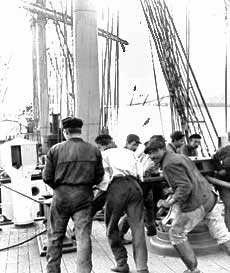Passion for the Water
Shannon Boyle
Working the Waters
May 12, 2007
Passion for the Working on the Water
My whole life I have felt connected to the water. I feel that the ocean runs through my veins, and when I am not near the ocean, something from my soul missing. In the book The Entangling Net by Leslie Leyland Fields, I realized that a lot of women share my same passion for the ocean. I saw that this passion transcends gender and pushes women beyond any assigned gender role. These women, like so many in the maritime world, use this passion to endure physical pain, harassment and humiliation.
There is no arguing that a women’s build is a lot different from a man’s. That is why some of these stories in The Entangling Net were so fascinating. Two of the women, Debbie Nielson, 5’ and 100 pounds, and Christine Holmes, 5’2” and 110 pounds, faced many physical challenges, but the passion of working on the water kept them going. Many of the women learned to use things around them to help with the physical demands, like using the waves to move a crab pot. As well as physical demands, to be a woman in the fishing industry, “you have to be twice as good (55).” The pure motivation to prove that you can do these physical jobs pushed these women far past any physical limitations that they thought they had. Christine Holmes tells her story of getting a job as a cook on a boat, but she really wanted to be a deckhand. The captain said she could prove herself on her breaks, and she did. “Every chance I had I got out on deck. Sometimes I worked twenty-hour days. On coffee break I’d do my cooking. I was wearing this captain down, ‘cause I wasn’t going to give up (64).” Even though this is physically exhausting, she did it to earn her spot as a deckhand on the boat and show the captain that she could.
Though these jobs are physically demanding, the physical element seemed to be the easy part of the job. The harassment on the job was, for many women, the hard part. Constantly being challenged by men in the industry, these women had to endure it in order to keep their jobs. Virginia Adams says, “During times of harassment- as long as it’s not serious harassment, someone’s not threatening you- you’ve got to kind of take it (55).” This idea may seem counter productive to women who crave equality with men, but these women were in a mode of survival in a male dominated industry. Also, by taking the harassment, the women are creating equality by not breaking down. Christine Holmes agrees with Adams saying, “You can’t take bullshit too seriously. I’m a really sensitive person who at times suffers from extremely low self-esteem and I still manage to do it (66).” These women have survived in this industry because they choose their battles; they are not up in arms about every comment because they realize that these men are just being assholes; the urge to be on the water over comes anything that these guys can throw at them.
Though I have never commercially fished, I have run up against a lot of this in the sailing and boating world I am involved with. Physically I have been so frustrated at the things I think I am incapable of doing that all the guys around me can do. But right when I get a comment like, “Here honey, I can do that for you,” I find an inner strength that some pushes me to new physical limits. I find that same strength when I when someone harasses me. I agree with these women that when someone harasses you it is not worth it to make a scene, simply take it with a grain of salt, and just show them on the boat, through your hard work, that you are nothing to mess with. I find this method really empowering. Instead of claiming harassment, which puts you in a role which men want to put you in, you show them you deserve to be out there just as much as they do.
I found these women to be inspiring to a young woman who wishes to have a life at sea. There is no masking that it is not an easy world to live in, but if it is you passion than you can do it. Debra Nielsen says, “It’s a worthwhile endeavor because it’s everything you are (124).” This love for working on the water can transcend gender, making gender just a word that has nothing to do with you. You become part of the team, part of nature, and these things become part of you.

